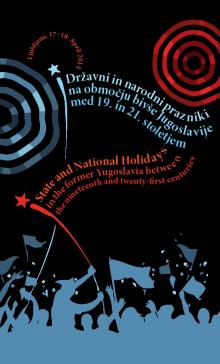17
APR
09:30
State and National Holidays in the former Yugoslavia between the nineteenth and twenty-first centuries
April 17, 2014 at 09:30 to April 18, 2014 at 13:00
ZRC SAZU, Geographical museum, Ljubljana
Organizer: University of Ljubljana, Faculty of Arts
Researchers of the Department of Ethnology and Cultural Anthropology of the Faculty of Arts (University of Ljubljana); the Institute of Slovenian Ethnology (Research Centre of the Slovenian Academy of Sciences and Arts (ZRC SAZU); and the Centre for Cultural and Religious Studies of the Faculty of Social Sciences (University of Ljubljana), have collaborated since 2011 in the research project Holidays and constitution of national community in Slovenia, led by Prof Dr Božidar Jezernik. * As part of the project, books Politika praznovanja (2013) and Praznična večglasja (2014) have been published thus far.
Having so far dealt with the history of the holidays calendar from the 19th century onwards, with political aspects of holidays, and with various holidays and festive practices from the point of view of the mutual constituitivity of holidays and various collectivities, primarily in the context of Slovenia, we now aim to compare our conclusions with similar research findings from the area that has historically had close contacts, formally since the establishment of the first Yugoslav state, when traditional folk festivals were joined by shared state holidays. Our aim is to discover the unifying or divisive effects of the latter on the population of the Yugoslav state, and their relation to other national holidays. When the second Yugoslav state was formed after World War II, still further – socialist – holidays were added to the holidays calendar, creating new time rhythms in addition to economic and social change. With what response did they meet at national and state levels, and what happened to them after the dissolution of the socialist state? Which holidays were they replaced with? How was the reception of traditional and new holidays in the calendar in specific periods between the 19th and 21st centuries (before WW I, in the years between WW I and II, after WW II), not only as regards political agendas of those in power, but also among various groups of people (by nationality, religion, profession, social status, generation, etc.)?
Programme: program_konference.pdf
Abstracts: povzetki.pdf
